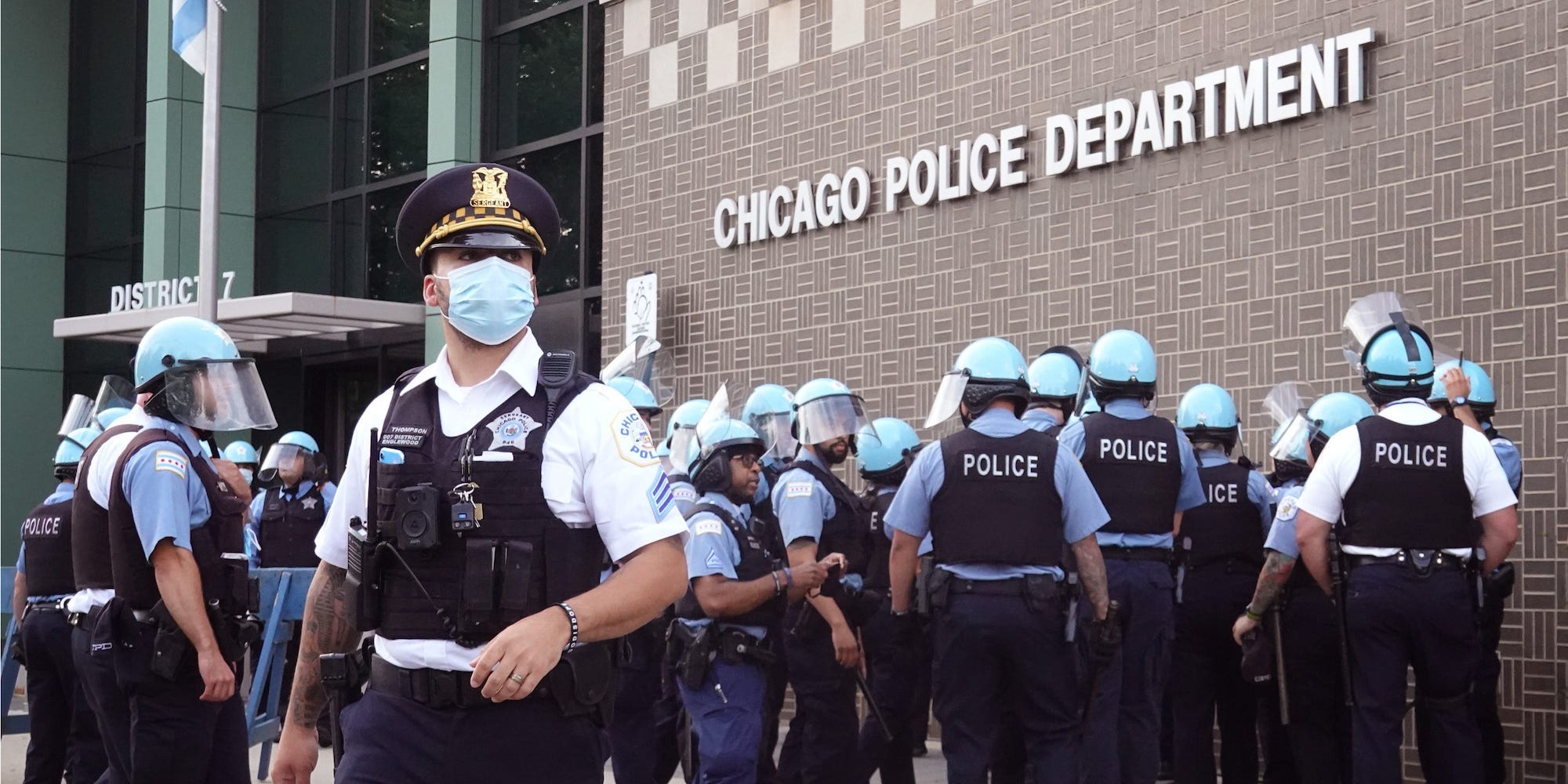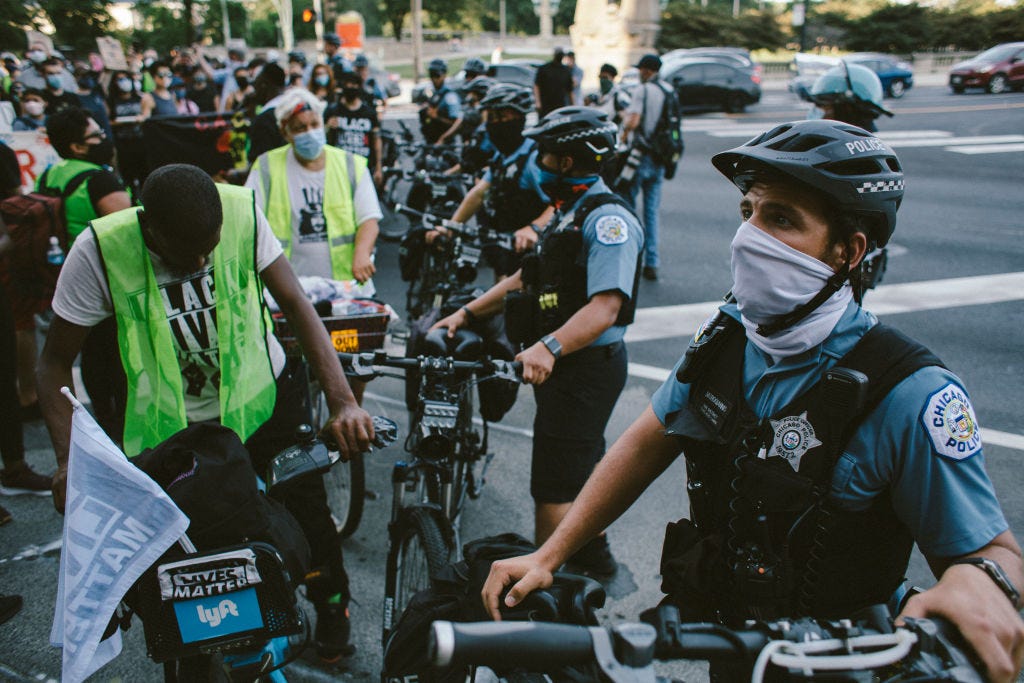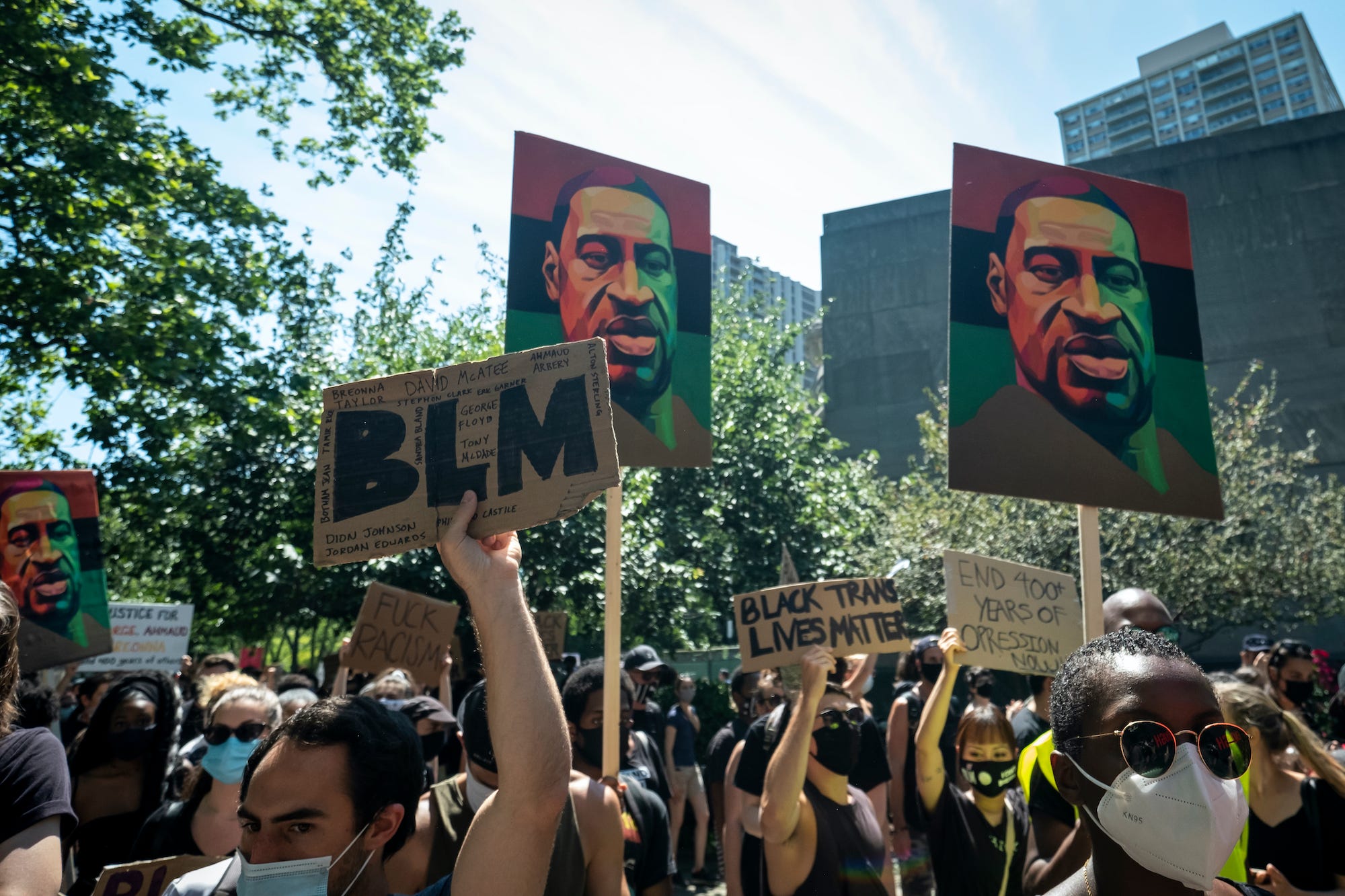
Getty Images/Scott Olson
- A new study suggests police officers of color and female officers are less likely to use force.
- Researchers evaluated data from millions of Chicago Police Department officer shifts from 2012-2015.
- Their findings offer some of the most precise data so far to support calls for police diversification
- Visit Insider’s homepage for more stories.
New research on the role that demographics play in policing could offer data-supported solutions to widespread calls for police reform in response to the surge of high-profile killings in recent years.
A new study published last week in the journal Science suggests that police officers of color and female officers are less likely to use force than their white, male counterparts, offering some of the first research to back calls for police force diversification as a method of reform.
“There are obviously a lot of papers that offer some conclusions about how demographics do influence policing outcomes,” Roman Rivera, a co-author of the study and an economist told Insider. “What really sets us apart is how the data was collected and how fine-grained it is.
For the study, Rivera, along with economist Bocar Ba, and political scientists Dean Knox and Jonathan Mummolo, analyzed Chicago Police Department data from 2.9 million officer shifts by nearly 7,000 officers from the years 2012 through 2015.
The team also evaluated 1.6 million enforcement events during the time period in order to examine how officers of different demographic groups behaved when faced with comparable situations in the field.
The project began in 2015, and the team spent years analyzing data assembled through a series of open-records requests over three years.
Diversifying police departments has been proposed as a possible reform tactic for decades, but this study offers some of the most precise data that supports the idea
The data revealed that Hispanic and Black officers made far fewer stops and arrests and used force less often than white officers, especially among Black civilians. Researchers also found that female officers used less force and made fewer total arrests, including fewer arrests of Black civilians, than their white, male counterparts.

Jim Vondruska/NurPhoto via Getty Images
Researchers found that the disparities are driven, in large part, by a reduced focus on Black civilians. When Black and white officers were deployed to the same neighborhoods, Black officers, on average, stopped Black people 12.55 fewer times, resulting in a 39% reduction in comparison to white officers.
Black officers were also less likely to show enforcement over discretionary activities, like "suspicious behavior" - a reduction of 31% compared to the average white-officer volume.
"That probably leads us to believe that there is some amount of officer discretion that's coming into play in terms of where we're finding the differences," Rivera said.
Many of the recent high-profile police killings, including the 2020 murder of George Floyd, the 2016 murder of Philando Castile, and the 2016 murder of Alton Sterling, all began as incidents of alleged minor infractions.
Data also revealed that female officers made 0.61 fewer total arrests per 100 shifts and 0.54 fewer arrests of Black people, equaling a 7% and 9% reduction respectively in comparison to male officers. Female officers also used force against Black civilians at a reduced rate of 31% compared to the average male officer.
The study is specific in location and thus can't be used to draw nationwide conclusions
The authors caution that their study shouldn't be used to make generalizations about the role of demographics in policing nationwide. The paper's focus on one urban police department means its findings are not applicable to other departments across the country, particularly departments in rural or suburban areas.
Since the data is from 2012-2015, the study also doesn't account for recent changes in the Chicago Police Department, nor the impacts of the most recent push for police accountability and reform nationwide.
Still, the study lends credence to a reform idea that many community activists have been pushing for decades.
"That's what we expect," Regina Russell, co-chair at the Chicago Alliance Against Racist and Political Repression told The Associated Press. "That's why we've been pushing for this for years.
But some activists say police diversity initiatives are 'missing the point'
"One of the officers who pinned George Floyd to the ground was Black," Erika Maye, Deputy Senior Director of Criminal Justice + Democracy Campaigns at Color of Change told Insider. "Racist policing is not an issue of representation; it's the result of a destructive police culture that devalues Black lives."

Ira L. Black/Corbis via Getty Images
Maye called diversification a "band-aid" solution and said the country's policing system is past the point of reform.
"To the extent that researchers are looking to address anti-Black racism and violence by the police, studies should be focusing on alternatives to the current system - not minor fixes," Maye said.
Color of Change is working toward a safer approach to public safety that addresses a lack of resources to fully fund community-based violence prevention programs, Maye said. The organization also works to call attention to police unions and associations that allow anti-Black police violence to go unchecked.
Rivera hopes the study can be a guide for other researchers studying police accountability in the future
"What this paper really does is provide a road map in terms of how other studies can use similar data in other cities," Rivera said.
He said he hopes the study pushes other researchers, journalists, and activists to request and identify data in a push for "increased data-transparency among police departments, who keep an incredible amount of data."
"We can answer and explore a lot of important policy questions with data that already exists," Rivera said.